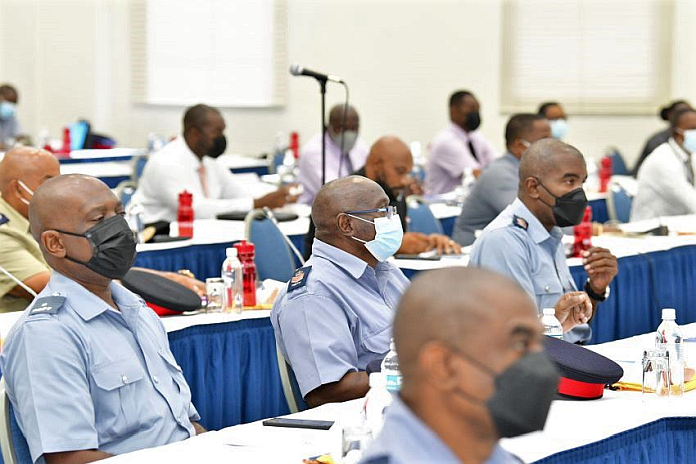By Sharon Austin
BRIDGETOWN, Barbados, (BGIS) — Attorney-General Dale Marshall believes steps should be taken to look at setting up an auxiliary or reserve police service for this island.
Marshall expressed this view as he addressed the Barbados Police Service’s two-day Annual Grand Conference 2022, at the Lloyd Erskine Sandiford Centre on Wednesday, under the theme Building Resilience through Innovation, Collaboration and Post Pandemic Recovery.
The attorney-general told his audience that the COVID-19 pandemic revealed the need for public sector organisations to have a capacity to supplement manpower to deal with critical incidents or other emergencies.
“This is of the utmost importance in the case of the Police Service. In a small country like ours, there is one national police service and so, unlike larger countries, mutual aid from similar organisations is simply not available. The risk experts advise that we have not seen the last of pandemics. You should also note that we live in a region that is subject to extreme weather events.
“Steps should therefore be taken to see about having an auxiliary or reserve police service. The Police Act makes provision for a Special Constabulary that was envisaged to perform this role. But I am advised that due to the exigencies of the police force, … particular arrangements were made not in keeping with the intention of the legislation. These remain today, and so, the police service does not have a credible auxiliary,” he noted.
Marshall pointed out that at least two English-speaking Caribbean countries had police auxiliary units, and in the UK, Police Community Support Officers were employed to assist frontline police officers in policing national events, and providing support as required in other circumstances. Therefore, he stressed, there was ample precedent to guide officials here as they considered this issue.
During his wide-ranging address, the attorney-general said body-worn cameras were now being used by many police services across the world, and stated that the initiative promoted transparency. He surmised that the cameras documented the interaction between police and the citizens.
“Their use helps to deter illegal and inappropriate behaviour by both the police and the public. We have provided these resources for our police service, [and] we have just made an order for another 100 body cams…. I encourage the use of body cams in all of your work, and commissioner, I think that you now need to complete a code of practice for their use, and also let us make this information available to members of the general public.
“In the recent videos that were circulated with the members of the police service responding in Chapman Lane and in the Pine, the commissioner has given me the assurance that body cams were worn by officers who responded, and that video when uploaded, would have presented a very different picture than sometimes the unflattering images that we see, which make their way to social media,” he said.
Marshall pointed out that the recruitment of officers remained one of the administrative problems facing the police service. He said the service was authorised to have 1,530 officers, but there were currently 278 vacancies within the ranks, thus representing a shortage of about 18 percent of its authorised strength.
“This is a substantial number and is not sustainable. It also brings into focus whether the current complement is providing, or can provide the police services that the public of our country demands, and also whether serving officers are not overstretched to make up for the shortage of numbers,” he suggested.
The attorney-general lauded the policemen and women for their hard work, including during the pandemic, saying the government greatly valued their contribution to the country.





